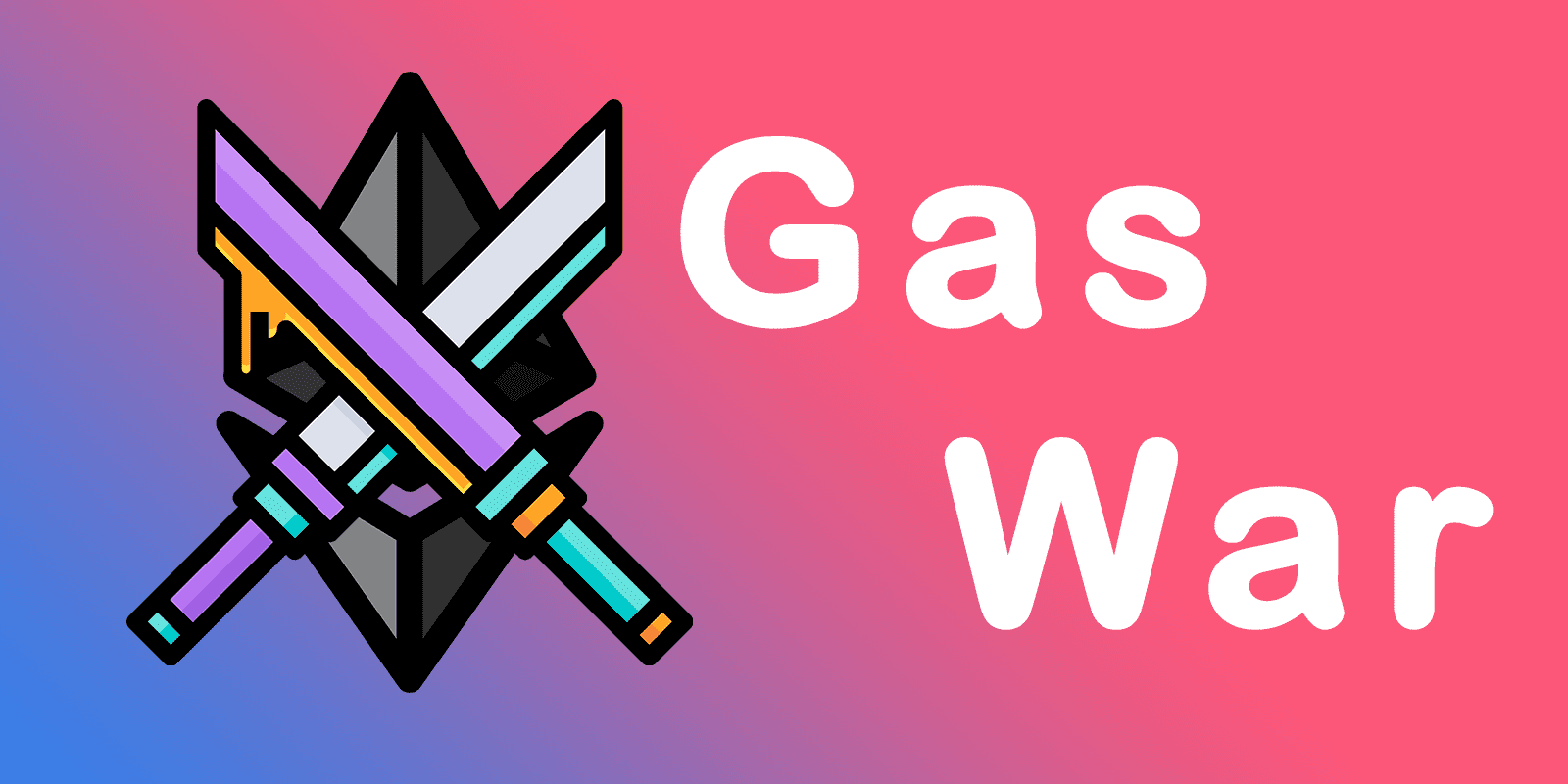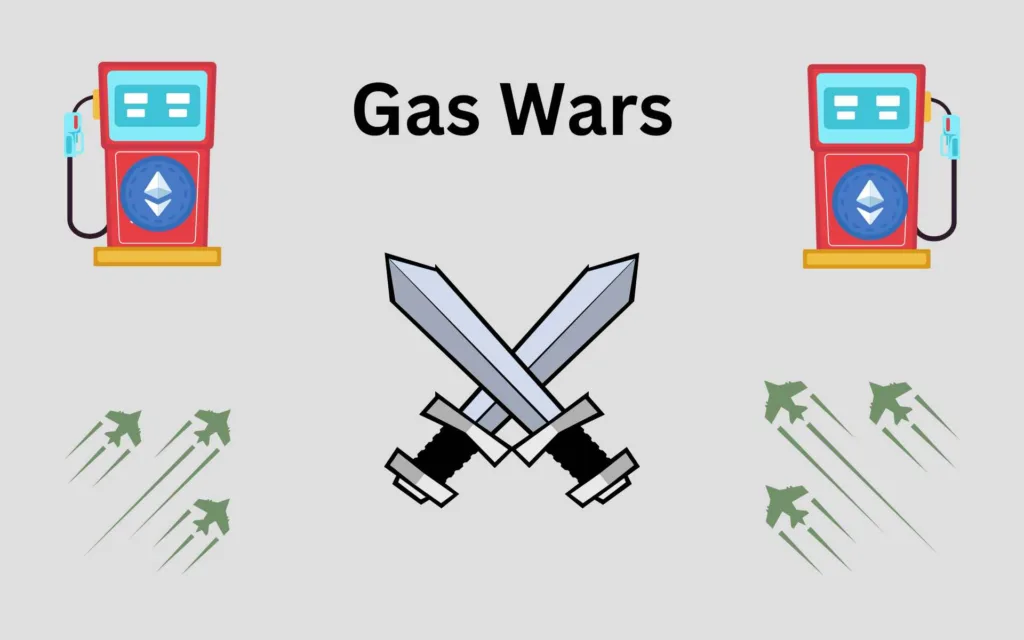1. What is Crypto Gas War?

Gas War or "gas fee battle" occurs when users compete to execute transactions on a blockchain, particularly on Ethereum, by increasing their gas fees to prioritize their transactions. This often leads to a significant rise in gas fees as the network becomes overloaded.
Track gas fees at: https://etherscan.io/gastracker
2. Causes of Gas Wars
-
Rapid Growth of NFTs and Memecoins: The explosion of NFT (Non-Fungible Token) and Memecoin projects has led to a surge in transaction volumes on blockchains. When many people transact simultaneously, the network becomes overloaded, resulting in a Gas War.
-
Transaction Spikes: Large events or token airdrops can cause a dramatic increase in transaction volumes, forcing the network to handle a large number of transactions in a short period, creating competition for gas fees.
-
Trader Competition: Traders wanting their transactions confirmed quickly often bid higher gas fees to attract miners or validators. This creates a competitive environment for gas fees among traders.
-
Airdrop Campaigns: Airdrops, where users rush to claim newly issued tokens, can also cause significant Gas Wars, leading to skyrocketing gas fees.
3. Gas Wars Operation
-
Gas Fee Structure: Gas fees are the costs users pay to execute transactions on a blockchain. Fees are based on the complexity of the transaction and the priority desired by the user. When many users bid high gas fees, the overall gas fee rises.
-
Gas Pricing Strategies: Users employ different strategies to set gas prices, such as raising fees during network congestion or lowering fees during quieter times. However, during a Gas War, increasing fees is often the only way to ensure a transaction is processed quickly.
-
Impact of Timing on Gas Fees: Transaction timing significantly affects gas fees. During peak times, such as major events or new product launches, gas fees can spike due to high demand.
4. Effects of Gas Wars on Users
-
Increased Transaction Costs: Gas Wars significantly raise transaction costs, sometimes exceeding the value of the transaction itself. This is particularly challenging for users making smaller transactions.
-
Transaction Difficulties: When gas fees are high, many users may be unable to execute their transactions or may experience delays, affecting user experience and blockchain efficiency.
5.Mitigating the Impact of Gas Wars

-
Use Layer 2 Solutions: Layer 2 solutions, such as Optimistic Rollups or zk-Rollups, help offload transactions from the main chain by processing them off-chain and only updating the final results on the main blockchain. This reduces gas fees and speeds up transactions.
-
Choose Off-Peak Times for Transactions: Users can save on gas fees by transacting during times when the network is less congested, typically outside peak hours or weekends when transaction volumes are lower.
-
Adjust Gas Pricing Strategies: Understanding how gas fees work and adjusting pricing strategies can help users reduce costs. Utilizing tools for tracking and forecasting gas fees is also effective.
6. Gas Wars Across Different Blockchains
-
Gas Wars on Ethereum: Ethereum is the most popular blockchain and experiences the most Gas Wars due to high transaction volumes from NFT and DeFi projects. Gas fees on Ethereum are often very high during network congestion.
-
Gas Wars on Binance Smart Chain: Binance Smart Chain (BSC) has lower transaction fees compared to Ethereum but still experiences Gas Wars during major events or spikes in transaction volumes.
-
Gas Wars on Polygon: Polygon (formerly Matic) is a Layer 2 solution for Ethereum that reduces gas fees and transaction speeds. However, as Polygon becomes more popular, Gas Wars may also occur if transaction volumes surge.
7.The Future of Gas Wars
-
Technological Improvements: Many projects are researching and developing new technologies to reduce gas fees and improve transaction performance. These improvements include optimizing blockchain structures, deploying Layer 2 solutions, and developing new protocols.
-
Potential Solutions: Solutions like Ethereum 2.0, which transitions to a Proof of Stake (PoS) consensus mechanism, promise to reduce gas fees and enhance network scalability. Other projects are also exploring ways to minimize Gas Wars through transaction optimization and network performance improvements.
8. Gas Wars and their impact on the Crypto Market
.webp)
-
Impact on Token Prices: Gas Wars can affect token prices when high transaction fees make users less willing to trade. This can lead to reduced liquidity and increased price volatility.
-
Growth of Gas Fee reduction projects: Projects focusing on reducing gas fees and improving transaction experiences are receiving increased attention and investment. The growth of Layer 2 solutions and alternative blockchains is a clear example of this trend.
9.Conclusion
Gas Wars are a common phenomenon in the blockchain world, particularly on platforms like Ethereum. They cause a significant increase in transaction fees and impact user experience. However, with technological advancements and new solutions, this situation can be mitigated, improving the performance and efficiency of blockchain transactions.
Read more:

 English
English Tiếng Việt
Tiếng Việt.jpg)

.jpg)
.jpg)
.jpg)

.jpg)
.jpg)

.jpg)
.jpg)
.jpg)




